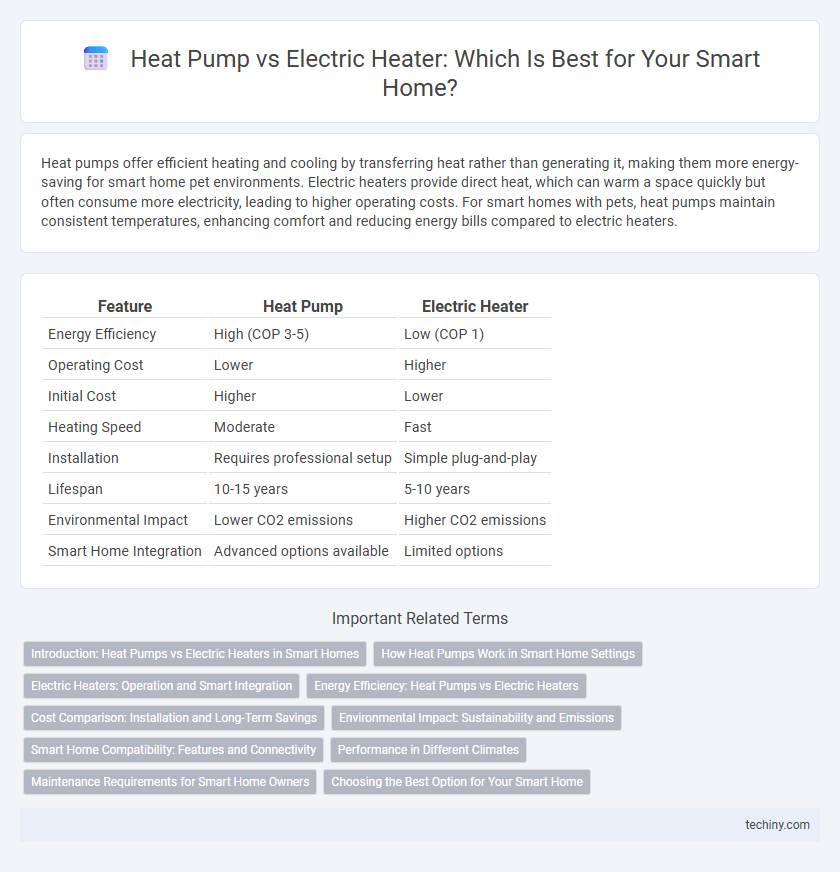Heat pumps offer efficient heating and cooling by transferring heat rather than generating it, making them more energy-saving for smart home pet environments. Electric heaters provide direct heat, which can warm a space quickly but often consume more electricity, leading to higher operating costs. For smart homes with pets, heat pumps maintain consistent temperatures, enhancing comfort and reducing energy bills compared to electric heaters.
Table of Comparison
| Feature | Heat Pump | Electric Heater |
|---|---|---|
| Energy Efficiency | High (COP 3-5) | Low (COP 1) |
| Operating Cost | Lower | Higher |
| Initial Cost | Higher | Lower |
| Heating Speed | Moderate | Fast |
| Installation | Requires professional setup | Simple plug-and-play |
| Lifespan | 10-15 years | 5-10 years |
| Environmental Impact | Lower CO2 emissions | Higher CO2 emissions |
| Smart Home Integration | Advanced options available | Limited options |
Introduction: Heat Pumps vs Electric Heaters in Smart Homes
Heat pumps and electric heaters serve distinct roles in smart home climate control, with heat pumps offering energy-efficient heating and cooling by transferring heat rather than generating it. Electric heaters convert electrical energy directly into heat, providing rapid warmth but often at higher operational costs. Integrating smart thermostats enhances both systems' efficiency by optimizing temperature settings based on occupancy and external weather data.
How Heat Pumps Work in Smart Home Settings
Heat pumps in smart home settings use advanced sensors and connected thermostats to efficiently transfer heat by extracting warmth from outdoor air or ground sources, providing both heating and cooling. Their integration with home automation systems enables precise temperature control and energy savings through adaptive scheduling and remote management. Compared to electric heaters, heat pumps significantly reduce energy consumption by leveraging renewable heat sources and optimizing performance via real-time data analytics.
Electric Heaters: Operation and Smart Integration
Electric heaters operate by converting electricity directly into heat through resistive elements, providing rapid and localized warmth ideal for smaller spaces. Their simple on/off functionality allows seamless integration with smart home systems via Wi-Fi or Zigbee-enabled thermostats, enabling precise temperature control and scheduling. Enhanced features such as remote monitoring, energy usage tracking, and compatibility with voice assistants optimize comfort and energy efficiency in modern smart homes.
Energy Efficiency: Heat Pumps vs Electric Heaters
Heat pumps deliver significantly higher energy efficiency compared to electric heaters by transferring heat rather than generating it, achieving Coefficients of Performance (COP) typically between 3 and 5. Electric heaters convert electricity directly into heat with a 100% efficiency rate but consume more energy overall, leading to higher operational costs. Using heat pumps can reduce electricity consumption by up to 50% in smart home heating systems, offering superior sustainability and cost savings.
Cost Comparison: Installation and Long-Term Savings
Heat pumps generally have higher upfront installation costs compared to electric heaters due to their complex components and the need for professional setup. However, heat pumps offer significantly lower operational expenses by efficiently transferring heat, resulting in substantial long-term energy savings. Over time, the reduced electricity consumption of heat pumps makes them more cost-effective despite their initial investment.
Environmental Impact: Sustainability and Emissions
Heat pumps offer superior environmental sustainability compared to electric heaters by using ambient air to transfer heat, resulting in significantly lower greenhouse gas emissions. Electric heaters rely solely on resistive heating, consuming more electricity and increasing carbon footprints, especially when powered by fossil fuel-based grids. Employing heat pumps in smart homes aligns with eco-friendly goals by maximizing energy efficiency and reducing long-term environmental impact.
Smart Home Compatibility: Features and Connectivity
Heat pumps offer superior smart home compatibility with integrated features like Wi-Fi connectivity, remote control via mobile apps, and compatibility with major smart home ecosystems such as Google Home and Amazon Alexa. Electric heaters typically provide basic on/off scheduling and remote control but lack advanced automation and energy optimization seen in heat pumps. The enhanced connectivity of heat pumps enables real-time energy monitoring and smarter climate control, optimizing both comfort and efficiency within smart home environments.
Performance in Different Climates
Heat pumps deliver superior energy efficiency in moderate to cold climates by extracting heat from the air or ground, reducing electricity consumption compared to electric heaters that convert electricity directly into heat. In colder regions, advanced heat pumps with enhanced defrost controls maintain performance, while electric heaters provide consistent output regardless of outdoor temperature but at higher operating costs. Heat pumps excel in variable climates by offering both heating and cooling functions, optimizing year-round comfort and energy savings.
Maintenance Requirements for Smart Home Owners
Heat pumps require regular maintenance such as cleaning filters, checking refrigerant levels, and inspecting electrical components to ensure optimal efficiency and longevity. Electric heaters demand minimal upkeep, primarily involving dusting and ensuring safe electrical connections, making them simpler but potentially less energy-efficient than heat pumps. For smart home owners, integrating maintenance alerts and diagnostics via home automation systems can streamline upkeep and prevent unexpected failures.
Choosing the Best Option for Your Smart Home
Heat pumps offer greater energy efficiency and lower operating costs compared to electric heaters, making them ideal for sustainable smart homes focused on reducing carbon footprints. Electric heaters provide quick, localized heating and are easier to install, fitting smaller spaces or supplemental heating needs within smart home systems. Selecting the best option depends on climate, home size, and integration with smart thermostats and energy management platforms for optimized performance.
Heat Pump vs Electric Heater Infographic

 techiny.com
techiny.com